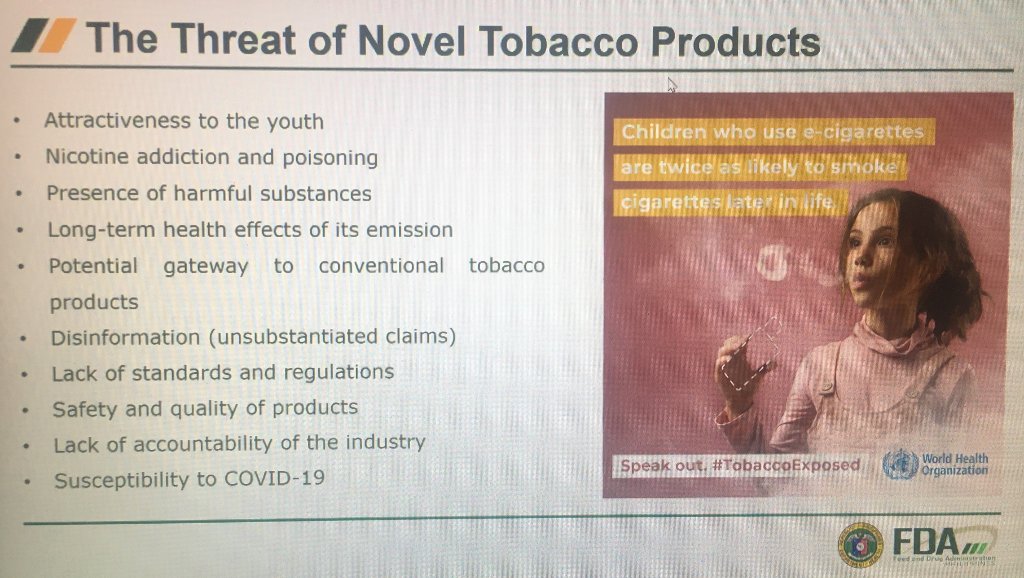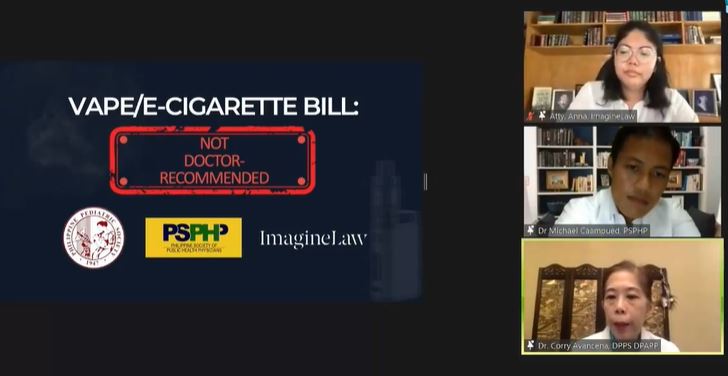Electronic cigarette (e-cigarette) smoking or vaping could open the way for the youth and non-smokers to use alcohol and illegal drugs, warned health experts who described these novel products as anti-health.
They called for the scrapping of a Senate bill aimed at regulating sales and consumption of these products that are being promoted as harmless alternatives to traditional cigarettes.
“Ang nicotine po ay addicting (at) ang mga gumagamit ng vape (ay) hindi po makahinto (Nicotine is addicting and those who use vape cannot stop),” cautioned Dr. Antonio Dans, president of the Asia Pacific Center for Evidence-Based Healthcare, during a news conference on Aug. 31.
“Bakit papalaganapin po natin ang paggamit nito at isasama pa natin ang kabataan…Hindi lang po ito addicting, ito rin po ay daan para maging addict (ang mga kabataan) sa ibang mga illegal drugs (Why do we propagate their use and involve the youth? They are not just addicting. They can also pave the way for them to become addicted to other illegal drugs),” he said at the online event organized by the Philippine College of Physicians (PCP), an association of internal medicine experts.
Dr. Glynna Ong-Cabrera, a pulmonary specialist and chair of the Philippine College of Chest Physicians, added that vape users “had a higher risk of alcohol use and binge drinking compared to non e-cigarette smokers,” citing a 2020 study published in The American Journal of Drug and Alcohol Abuse.
Besides alcohol use, e-cigarette smoking will open the gate to illicit drug use such as cocaine, amphetamine, inhalational drugs, hallucinogens, and ecstasy, added Dans, citing a 2017 study published in The American Journal on Addictions.
“If our government is really against drugs, why are we giving the youth the means to use illegal drugs?” he said.
Junk vape bill
Dans, Cabrera, along with other medical experts, urged the Senate to junk SB 2239 or the Vaporized Nicotine Products Regulation Act that aims to regulate the importation, sale, manufacture, distribution and use of vape and heated tobacco products (HTPs).
Speaking in Filipino, Dans said: Our call is, junk the bill. Do not approve. We already have a lot of problems as we confront the pandemic. Let us not add to our problems.”
SB 2239, sponsored by Senate President Pro Tempore Ralph Recto, lowers the age of access of vaporized nicotine products (VNPs) and HTPs, and eases up the restriction on vape flavors. Its counterpart measure, House Bill (HB) 9007 was passed on third and final reading in the Lower House last May.
Dr. Maricar Limpin, president of the PCP and a pulmonary medicine expert, also told reporters they oppose the proposed measure as it puts back the age of sale and use of novel tobacco products to 18 years old from 21 years, citing Republic Act (RA) 11467, a law that increased the excise tax on alcohol products, e-cigarettes and HTPs.
“This had been corrected under RA11467, but now it is being retuned to 18 years of age,” she said.
In an Aug. 24 Senate plenary session, Recto argued that the legal age is 18 years old.
“(For) tobacco products today, the legal age is 18, alcohol is 18…the age of majority is 18…(but) based on the sin tax law, it is 21,” said Recto while being interpellated by Sen. Aquilino ‘Koko’ Pimentel.
As the sponsor of the bill, Recto says that it is the “responsibility of retailers to verify the age of buyers.”
Vape bills are anti-youth, anti-health, and regressive
SB 2239 also removes the ban on all flavorings, making it appealing to the youth, according to Dr. Corry Avancena, head of the Task Force on Anti-Smoking of the Philippine Academy of Pediatric Pulmonologists (PAPP).
“The flavoring is one reason why the youth are getting into vaping. And these flavorings are not without harm,” she said.

These are some of the ingredients present in the e-liquid or e-juice, which are harmful to one’s health, according to Avancena, a pediatric pulmonology expert.
Read: VERA FILES FACT SHEET: Smoke-free alternatives to cigarettes explained
Avancena said a major reason why some try it is because they see people smoking or vaping, and they want to try these many flavors because they think e-cigarettes are safe compared to traditional tobacco smoke.
According to Kristine Latorre-Mendoza, a pediatric neurology expert, young people, especially those from 15 to18 years old, are easily influenced when they see others using vape.
“At the age of 15-18 years, they are very vulnerable because this is the time that their abstract thinking and complex task decision-making are being developed and enhanced,” she said.
“This vape bill is anti-health, anti-youth, anti-poor, and will open (the gate) to illicit drug use, if passed,” Benito Atienza, President of the Philippine Medical Association (PMA), declared at the news conference.
“We say it is a regressive bill because instead of leading us in the right direction, we are being led astray. That is why this bill should be junked,” added Limpin, echoing Atienza’s stand.
Meanwhile, Limpin also expressed opposition to the transfer of the regulation of novel tobacco products from the Food and Drug Administration (FDA) to the Department of Trade and Industry.
“In short, habang kami po ay busy, kami pong nasa health sector… bigla pong naipasa sa Lower House ang House Bill 9007 na mukhang dinisregard po ang position ng health sector dahil lahat ng mga inaayawan namin ay nailagay po doon.
(While we in the health sector were busy, the Lower House suddenly passed HB9007 and it appears that they disregarded our position because all that we opposed are present in the bill),” she said at the forum.
“It also appears that SB 2239 is being rushed and this is happening while we are all (busy) fighting COVID-19,” she added.
Editor’s note: VERA Files is part of Project STOP the Smoke, which has support from the International Union Against Tuberculosis and Lung Disease, Inc (The Union) and Bloomberg Philanthropies.




